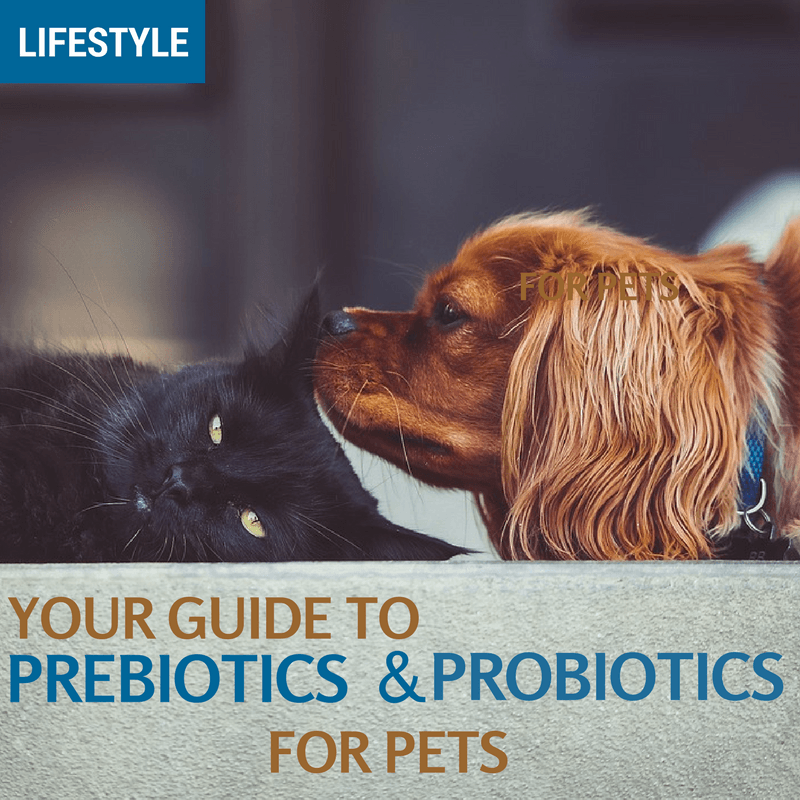Your Guide to Prebiotics and Probiotics for Pets
Share
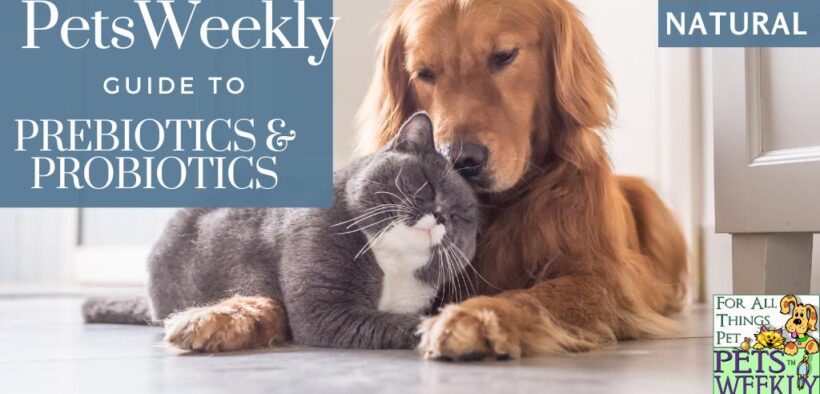
There are millions of health supplements available for pets. In fact, supplements are a $600 million industry right now and shows no sign of slowing down. But, some of the best ones you can choose are prebiotics and probiotics for pets. Today, we are looking at a few of the options available and why we consider them to be good. First, let’s examine the good, the bad and the ugly side of supplements.
Pet supplements offer a double-edged sword in the pet industry. The mass availability of everything from mushrooms to CBD is good because we have lots of supplement options; but bad because almost none of them are regulated. Only a handful of manufacturers spend the time required educating the customer on how to use them for pets. This is why it’s important to choose a brand you can trust.
Pet Supplements: The Good and the Bad
On the positive side, they can fill major nutritional gaps in a pet’s diet, addressing specific concerns like joint health, skin and coat issues, or digestive problems. These targeted boosts can enhance a pet’s overall well-being and quality of life. Additionally, pet owners increasingly view supplements as a way to take proactive care of their companions, aligning with trends in human health.
However, the downside shouldn’t be ignored. The market can be unregulated and flooded with products making dubious claims, potentially harming pets if not chosen carefully. Moreover, overdoing supplements can lead to imbalances and even toxicity. Consulting a veterinarian before diving into the world of pet supplements is crucial, ensuring your pet gets the right boost without facing unnecessary risks.
That said, before you move forward with giving prebiotics or probiotics (or any natural remedy) to your pets, you should consult your veterinarian. Why is this important? Because some supplements (like Prebiotics), can actually worsen an existing GI condition.
What are Prebiotics and Probiotics?
Before we discuss our favorites for dogs and cats, let’s define a few key terms.
- Probiotics are “good” bacteria that work with your pet’s digestive enzymes (microflora) that help regulate your pet’s gut health.
- Prebiotics are the foods that probiotics feed on.
- Microflora are microscopic algae, fungi and bacteria that live together in a “colony” in your pet’s gut. This community is so complex and important that some scientists liken it to a “metabolically vital organ” (Whelan, 2010).
Here is why they are so important for your pets:
- Probiotics are live microorganisms that increase microflora to improve overall health.
- Prebiotics are types of dietary fiber that feed the microflora in the stomach.
- Prebiotics and probiotics can both help improve gut health, fight illnesses and improve overall health
- Probiotics are good for nearly all pets, but prebiotics should be avoided in pets with digestive issues
NOTE: When possible, we use affiliate links in our posts.
Probiotics for Pets
At their most basic function, probiotics help support a healthy digestive function. Probiotics do it by increasing the healthy microflora; prebiotics by feeding the microflora.
This helps make the digestive system function more smoothly, which may help improve immunity, decrease inflammation, improve digestive function and much more.
The word probiotic is derived from three Greek words:
pro- meaning “in favor of”
bios- meaning “life”
-otic which indicates a “relationship to an action, process, state, or condition”.
Literally translated, probiotics means a condition in favor of life.
Probiotics are live enzymes, yeasts, and microorganisms that help us stay healthy, but more than that, they are the things our bodies need to function optimally and sustain life. Some believe that over 70% of our (and our pets) immune function is in our gut.
Now, we can improve the ability of these microorganisms by eating a healthy, well-balanced meal that include foods that naturally contain high levels of these organisms (fermented foods like sauerkraut, kimchi, yogurt, apple cider vinegar, miso, and more). But it would take a LOT of yogurt and kimchi to obtain the same benefits you see from probiotics.
How Probiotics Work
Just like us, pets have to maintain a certain level of healthy bacteria to properly digest food. When their microflora is out of balance, they begin to have health problems.
When your pets fail to create enough microflora, or the “good bacteria” is killed off by medication or stress, it is important to have a secondary source to help those colonies flourish. Things that can throw your pets system out of whack includes:
- Illness (any type of illness can impact your pet’s digestive health)
- Medication, particularly antibiotics (which destroys both good and bad bacteria)
What are Prebiotics?
Prebiotic fiber is the non-digestible parts of foods (like banana skin, onion peels, beans, chicory root, and many more). This beneficial dietary fiber actually helps feed the “good microflora” in your pets digestive system.
Be sure to discuss the advantages/disadvantages of prebiotics with your veterinarian. Some animals, particularly those who have ongoing gastrointestinal difficulties, will not benefit from prebiotics.
After you have your vet’s “all clear”, it’s time to think about selecting the best supplement for your pets. When selecting a probiotic or prebiotic, it’s important choose a species-appropriate product. Giving your cat a prebiotic designed for dogs will not do a lot to support healthy digestion. Cats are very different than dogs (just as we are different from dogs).
Choose supplements that have been specifically designed for each species. They probably won’t hurt your pet (or yourself) if you take probiotics designed for another species, but they won’t be very helpful either.
Who Benefits from Prebiotics
Every animal with a digestive system can benefit from probiotics, including dogs, cats, horses, even birds. A healthy gut may help improve digestion, improve nutrient absorption, prevent disease, and even boost your pet’s immune system and help keep animals more calm.
Here are some other benefits of probiotics:
- Allergies to food or environment
- Skin and Coat conditions: including fur loss, skin and coat problems, dermatitis, Black Skin Disease, yeast overgrowth, alopecia X, allergies, and more.
- Inflammatory conditions: arthritis, dental disease, joint pain, etc.
- Digestive Health Issues, including constipation, diarrhea, gas, bloating, Irritable Bowel Syndrome (IBS), Inflammatory Bowel Disease (IBD) in pets, GI tract infections, GI parasites in pets, Leaky Gut Syndrome, Diverticulitis, pancreas, vomiting and abrupt changes in diet
Different animals benefit from specific supplements. In horses, you may find that the issues of colic decrease. But, in dogs, you may see performance improvements, improvement in skin conditions, a reduction in joint pain and even an increase in neurological function. Cats, on the other hand, may see improvements in gut health and bowels.
In nearly all animals, including humans, you’ll see a stronger immune system, reduced flatulence, improved skin and coat, improved gastrointestinal processes, and as you continue to improve, you’ll find that their (and your own) sense of well-being has improved.
But all of these results depend on finding the delicate balance of gut microflora, and every animal is different.
Which Species Can Take Probiotics?
Probiotics are specially formulated to support the digestive health of cats, dogs, horses, birds, and farm animals. Since all animals are different, they obviously have individual needs with different recommendations for each species and even each individual. You’ll want to select the proper probiotic by species in order to receive the best results.
There isn’t a single probiotic that is “best” for every dog or every cat or every horse. You may need to explore a few brands until you find one that is effective for each of your pets. The following probiotic strains have some scientific evidence to support their safety and efficacy in dogs:
These probiotic strains have some scientific evidence to support their safety and efficacy in dogs:
- – Enterococcus faecium
- – Lactobacillus acidophilus
- – Lactobacillus casei
- – Lactobacillus plantarum
- – Bifidobacterium bifidum
- – Bifidobacterium animalis
- – VSL#3
These probiotic strains have some scientific evidence to support their safety and efficacy in cats:
- – Bifidobacterium bifidum
- – Bifidobacterium animalis
- – Enterococcus faecium
These are a few probiotics that we’ve found to be very beneficial to pets.
Pro-Bloom from The Honest Kitchen
The Honest Kitchen’s special probiotic blend saved my dog’s lives when they were puppies. We learned that all three of our foster dogs were allergic to the regular puppy milk replacement formula we were giving them was causing the same symptoms as parvovirus.
We switched over to Pro Bloom, and the symptoms immediately stopped.
This all-natural goat’s milk probiotic formula is great for both dogs and cats. With over 5 billion active probiotics and digestive enzymes, it can be mixed with The Honest Kitchen’s dehydrated food or served alone as a nutritious liquid snack. It’s ideal for dogs who have sensitive stomachs.
Here are the listed ingredients in Pro-Bloom:
- Dehydrated goat’s milk
- dried aspergillus oryzae fermentation product
- dried candida rugosa fermentation product
- dried trichoderma longibrachiatum fermentation product
- dried pineapple fermentation product
- dried lactobacillus casei fermentation product
- dried lactobacillus acidophilus fermentation product
- dried lactobacillus brevis fermentation product
- dried bifidobacterium longum fermentation product
- dried streptococcus thermophiles fermentation product
Purina’s FortiFlora®: Available for dogs and cats
FortiFlora (available for dogs) and FortiFlora for Cats is a probiotic supplement for the dietary management of dogs and cats with diarrhea.
These formulas contains a probiotic proven to promote normal intestinal microflora.
Here are their listed ingredients:
- Animal digest
- brewers dried yeast
- Enterococcus faecium
- L-ascorbyl-2-polyphosphate (source of Vitamin C)
- Vitamin E supplement
- beta-Carotene
- zinc proteinate
- taurine
- salt
- manganese proteinate
- ferrous sulfate
- copper proteinate
- calcium iodate
- sodium selenite.
- A-2500
Nyzmes SUPER-FOOD supplements: Available for dogs, cats, horses
The Nzymes® SUPER-FOOD supplements, like the Nzymes® Antioxidant Treats or Nzymes® Sprouted Granules, include antioxidant vitamins and enzyme-rich nutrients along with the ‘live food enzymes’ that tell the body how to utilize this special nutrition. Nzymes® offers an unconditional 120-Day Money Back Guarantee on their products.
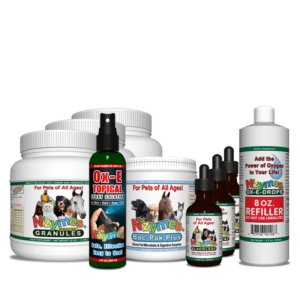
Natren Felinedopholus & Caninedopholus:
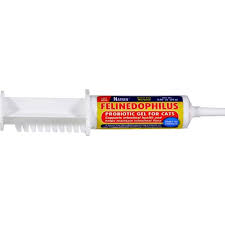
This probiotic contains active Lactobacillus acidophilus, NAS super strain, Enterococcus faecium, and NCIMB 10415 super strain at a total 6 billion cfu per 2 grams.
Remember that Natren Caninedophilus is cold-shipped and requires refrigeration immediately in order to keep the strains intact.
Humarian Probionix:
Probonix is an organic, non-GMO, and all-natural supplement for dogs, cats and humans. Their formulas are free from gluten, dairy, sugar, soy, eggs, fish/shellfish, and peanuts or any tree nuts.
These can be stored at room temperature. Read more about Probonix for Pets
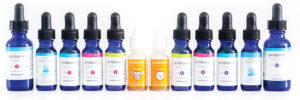
ActivPetz™
ActivPetz™ Treats from Loving Pets are delicious, affordable treats with therapeutic supplement levels of important supplements.
There are several versions of these fortified, low-calorie treats and each provides a different benefit to your dog. We are really liking the digestive health and probiotic formulas!
Best of all, each treat is made of real meat and fish that are free from grain, wheat, gluten, soy and corn.
Available in four therapeutic formulas and two varieties:
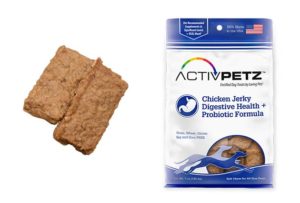
- Digestive Health & Probiotics(Chicken & Lamb)
- Hip and Joint(Beef & Chicken)
- Multivitamin & Immune Booster(Chicken & Duck)
- Skin and Coat (Chicken & Salmon)
We hope this helped you understand the difference between prebiotics and probiotics and that it helps you choose the best options for your pets.
